ITB Hospitality Day Talk on Iran, Greece, Georgia and Russia
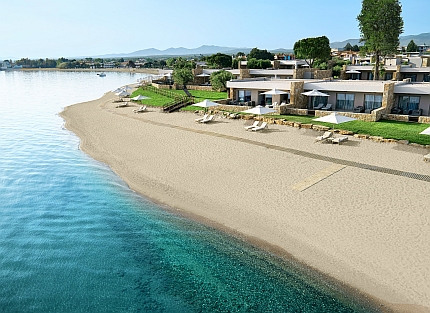 |
|
| Greece: The country picky up quickly in tourism despite severe challenges. Resort groups like Ikos invest into the future. |
Berlin (April 7, 2017). When Conrad Hilton described the key criteria for a hotel as "location, location, location", he failed to take one thing into account: Real estate is often more stable that the political and societal situation of the countries in which it is built. This is how one could describe the background to the "The Blessed and the Cursed" discussion during the ITB Hospitality Day. Hotel CEOs and tourism experts from Iran, Greece, Georgia and Russia spoke here on possible hotel performance in both good and bad times. Dramatically bad times, caused by wars or sanctions, can carry the seed for future fortune within them: It can only get better.
As international as the podium speakers were, so too were the four tourism destinations: Russia, Georgia, Iran and Greece. And adding a further international twist was the host, Sinsa Topalovic, Managing Partner Horwath HTL Zagreb. Each destination brought with it a different type of crisis – and so also opportunities, sometimes merely flashing up on the horizon, as each crisis brings.
"Greece has recovered very quickly. At least those who concentrated on international tourism were able to benefit from a nine-percent rise in guests," Topalovic said. But business travellers are still missing. Domestic tourism also collapsed by two thirds. Against this backdrop, the willingness to invest in hotel beds is still expected to remain modest up to 2020.
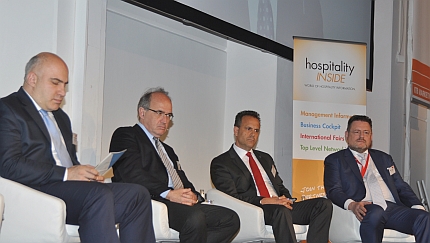 |
|
| The experts listen to the introduction of moderator Sinisa Topalovic at the "ITB Hospitality Day" 2017. / photos: HI |
Dr Aris Ikkos, Research Director of the Greek Tourism Association Insete put the basis of this growth into perspective. Of course, Athens in particular has recovered rapidly after the crisis. Yet previously, Greece's tourism expenditure contracted from EUR 3.8 billion to EUR 1.2 billion. Hotel openings by Wyndham and Electra in Athens are signs of a change in trend.
Greece secures turnaround
"Once the 'Grexit' issue is off the table, the situation will quickly improve," Ikkos said. Ikkos places less confidence in statistics from institutions such as Horwath HTL. Lots of investment is taking place on the Greek private market, he says, and this is unseen by international observers. "Our figures show an investment volume for 2016, including renovations, of EUR 800 million," Ikkos added. That's a strong figure which is underlined yet further by positive messages for 2017, he went on. Among these successes, Ikkos included the return of tourists from the United States, a very important group for Greece.
He once again reminded the audience of the start into 2016: with financial problems and a refugee crisis hitting islands such as Kos and Lesbos especially hard, 2016 saw contractions of 10 to 15 percent. Yet to claim that it nonetheless became a record year for Greece is only half the truth, he continued. "Income contracted sharply as large discounts were offered in response to pressure from tour organisers. At the same time, occupancy was very high.
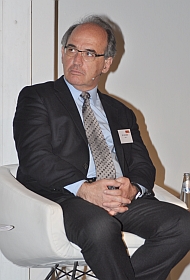 |
|
| Dr Aris Ikkos: Investors and operators return to Greece. |
Ikkos identified "financial uncertainties" as the main problem for the future, but for the hotel industry it's mainly the extremely high VAT tax rate on the islands: "If we had the rate Cyprus charged, the breakeven point would be 16 percent lower."
Georgia is booming and investing
There is less doubt as regards Georgia's remarkable upswing. The tiny Caucasian republic is among the countries with the highest increase in international tourists over the past eight years. 80 percent of all arrivals are by tourists and business travellers from outside the country. "As well as beach and business, new products are to appeal to further types of guest," George Chogovadze stated, Head of Tourist Board of the former CIS country. He referred here to the city, wine and ski-tourism segments.
Above all, ski infrastructure is being developed. Topalovic put the investment volume at USD 300 million by 2020. That would be almost 50 percent more than in Greece.
Chogovadze reported that there will not only be just three international hotel chains in the country for much longer. More brands would like to get a foothold in Georgia. InterContinental is just one chain, he continued, for instance, "though we also have Georgian hotel brands and the government is investing a lot. Private investors are also on board as over USD 3 million are to be invested over the coming years in infrastructure. The rise in guest numbers from 2017 (32% year-over-year) is no flash in the pan, he said. Four large ski regions play an important role here, he said. In these regions alone around USD 150 million is being invested in infrastructure mega projects.
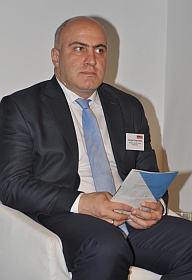 |
|
| George Chogovadze: The Georgian government lures investors with incentives. |
The strongest source markets are Georgia's neighbouring countries, Russia and Turkey. Thanks to three new flight connections with Wizz Air, strong growth is also possible from Germany. The country is even enticing hotel chains: Where an international hotel management company cooperates with a local investor, the state pays 50% of management fees for the first three years, Chogovadze reports. This prompted Omer Z. Kaddouri also on stage, CEO of the Arabic Rotana Hotels, to say "we want to sign up".
Iran soon on a bed of roses
Otherwise, Kaddouri is focusing early on the future market, Iran, for which he has already concluded the first hotel contracts: "There's been no hotel development there for 40 years and this makes it especially valuable for us." Even in the years of the international boycott, specifically since 2011, Rotana was active. "Meanwhile, we have concluded six management agreements."
The opportunity of being present in a future market has meanwhile also become apparent to groups such as AccorHotels and Meliá, he continued. Iran, after all, is a country of 80 million inhabitants, though with just over 1,300 hotels. At present, the investment climate in Iran after the removal of sanctions is very positive. Yet every new suspicion that the regime continues to work on developing atomic weapons could quickly extinguish these economic hopes. Recently, Iran recorded a rise in international travel by 12 percent. Investment here is often in partnership: Local land owners come on board in hotel construction companies.
Whether the few hotels operating in Iran at present are doing well isn't known. Statistcs are not available. Yet at least in Tehran occupancy has increased from 52 to 80% over recent years. "Now that the EU sanctions have been removed, 90% will soon be reached," Kaddouri stressed. Rates are not determined by the free market though, but by the government, he added.
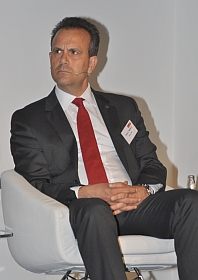 |
|
| Omer Kaddouri: A friend of Iran with first contracts signed. |
Russians revive their own market
Sanctions against Russia after the occupation of Crimea were less sweeping that those against Iran. For the manager Walter C. Neumann, CEO of the Russian Azimut Hotels, the low point has been passed in Russia: "It has been worse, there are signs for a return of travellers to Russia." After the first sanction shock in 2014, the basic conditions are now palpably more favourable. "Russia is now affordable." Whereas Moscow was among the ten most expensive cities in the world in 2014, it came in in 48th position in 2016. In 2016 it was now longer listed in the ranking at all.
"The suffering under the sanctions is over. Our occupancy rate has again returned to between 75 and 80%, as it was before." Against this backdrop, Azimut is betting on expansion. "In a few weeks, we will open a further 300 rooms. Of course, clear signs of more intensive investment are being awaited from Washington. "If western brands begin again to start taking an interest in Russia, then everything will again be a bed of roses."
Horwath HTL estimates domestic and foreign direct tourism investment in Russia of USD 3 billion. Neumann currently sees sports events as the biggest investment opportunity for Russia. The two large football tournaments over the next few years (Confed Cup and World Championships) will bring 2,000 to 3,000 hotel rooms in the 2 and 3-star sectors with them.
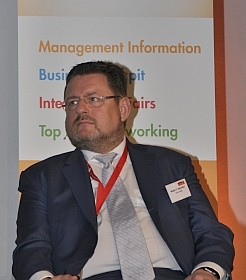 |
|
| Walter Neumann: Russia isn't suffering any more. |
Whilst in Western Europe the Olympic Winter Games in Sotchi 2014 are considered a prime example of excess, the Azimut boss sees it differently. Sochi has become a magnet for the public - in particular against the backdrop of a weak rouble and the sanction. Since last year, occupancy rates for the 30,000 or so beds in total have been excellent. Both in winter as well as in summer, as holidaymakers who would previously have gone to Turkey or Egypt are now to be seen on Russia's own Black Sea coast: "We have 2,880 rooms in one of the hotels. In 2016, we were able to increase our revenue there by 120%."
Of course, for leaps in revenue like that, you also need a little luck, Neumann said, referring playfully to the original discussion title. An analysis of Russian travel behaviour points to more intensive domestic tourism. Who was able to afford it, has travelled the world since the end of the last millennium. Political development now means Russians have focused more on their own huge home country. Investments in hotels outside the major cities are certainly not a mistake here. "In this huge country, there are only 120 hotels which conform to western standards," Neumann says. Alone for a conference in Ufa, several hotels were built.
Lake Baikal and Caucasus are both regions with huge potential. Investors in the Pacific harbour town Vladivostok have hardly needed to trust in their luck. There, Chinese and Japanese tourists have being trying their luck. A gambling licence for the city and a 9-day visa have ensured steady visitor flows. / Fred Fettner
Watch the video of this panel in full length!
Continuative Links:
- March 31, 2017 Stay safe, always care ITB Hospitality Day Talk about hoteliers role concerning safety security
- March 24, 2017 Guests going crazy ITB Hospitality Day Talk about the new impact of Internet of Things and AI
- March 24, 2017 Lending the soul from the full blooded restaurateur ITB Hospitality Day Talk on successful food concepts for hotel chains
- March 17, 2017 Tasty, colorful, social, central: ITB Hospitality Day Talk about the new colourful feeling
To print this article you have to be registered and logged in for newsletter, visitor or subscription.





